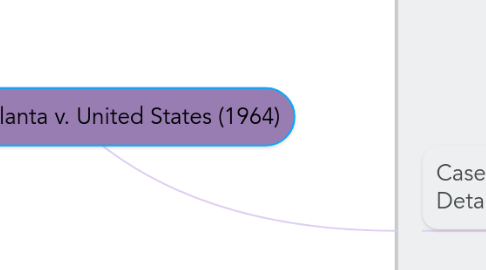
1. Case Details
1.1. Facts
1.1.1. Parties
1.1.1.1. Heart of Atlanta Motel
1.1.1.2. United States
1.1.2. What Happened
1.1.2.1. The Heart of Atlanta Motel refused to rent rooms to African Americans, a violation of the Civil Rights Act.
1.1.3. Procedural History
1.1.3.1. A federal district court ruled against the hotel owners claim that the Civil Rights Act was unconstitutional.
1.1.3.2. Heart of Atlanta Motel appealed the Supreme Court.
1.2. Issue
1.2.1. Whether the Civil Rights Act of 1964 is unconstitutional
1.3. Rule
1.3.1. U.S Constitution - Article 1, Section 8
1.3.1.1. The commerce clause permits Congress to regulate international / interstate commerce.
1.3.2. Civil Rights Act of 1964 - Enacted by Congress prohibiting racial discrimination
1.4. Analysis
1.4.1. Heart of Atlanta Motel challenged that it did not engage in interstate business. Its business activities were local, and Congress had exceeded its constitutional authority.
1.4.2. Opposing arguments were framed around operating statistics. Congress was exercising its power over interstate commerce.
1.4.2.1. 75% of guests were from out of state
1.4.2.2. The business advertised nationally
1.5. Conclusion
1.5.1. The court upheld the Civil Rights Act, via the power of Congress to regulate interstate commerce.
1.5.2. This decision prevents discrimination by businesses, and impacts all industries.
1.5.2.1. For example a doctor could not refuse service for discriminatory reasons since arguments could be made that his business affects interstate commerce.
1.5.2.1.1. Ex. A customer drives in from out of town.
